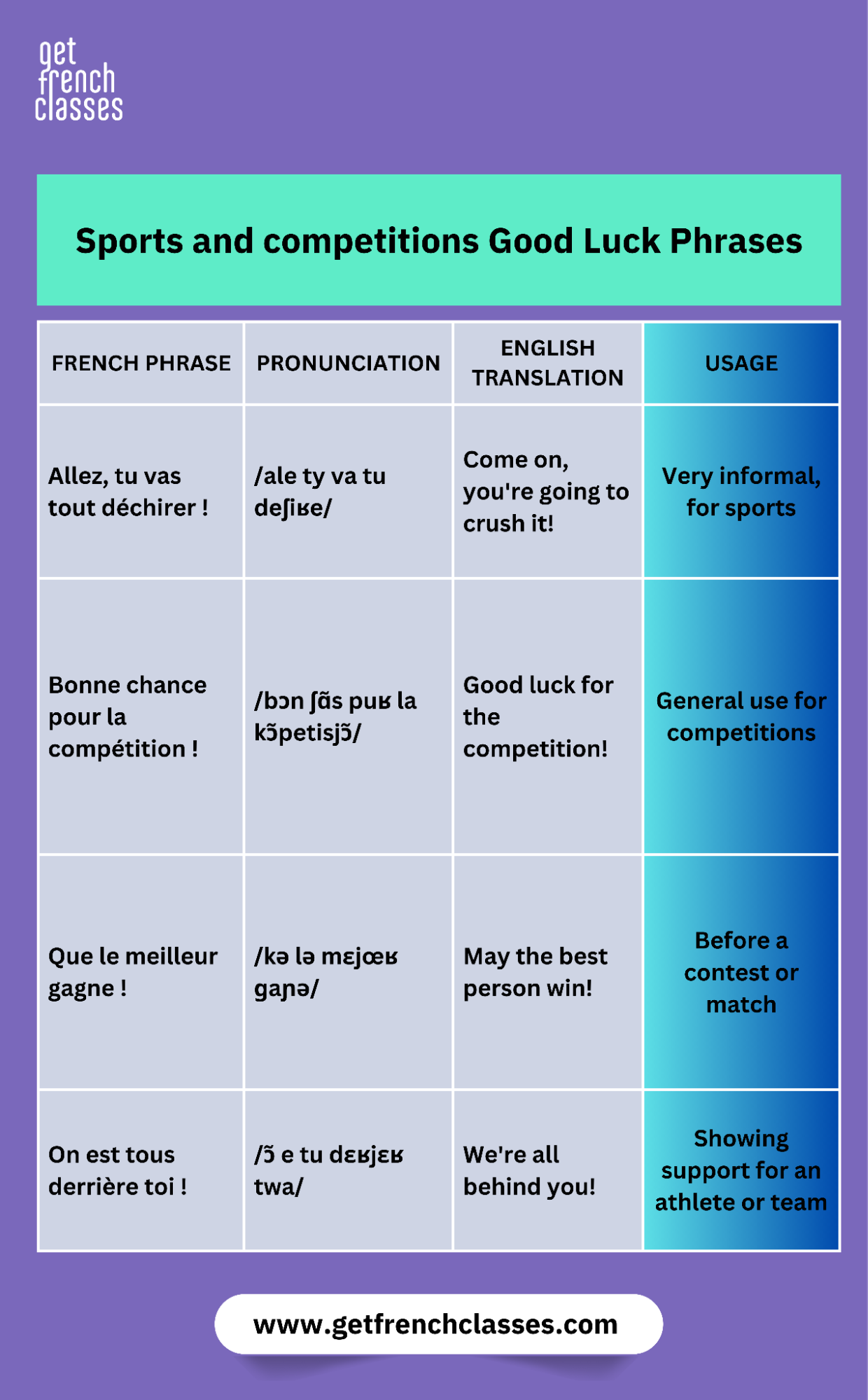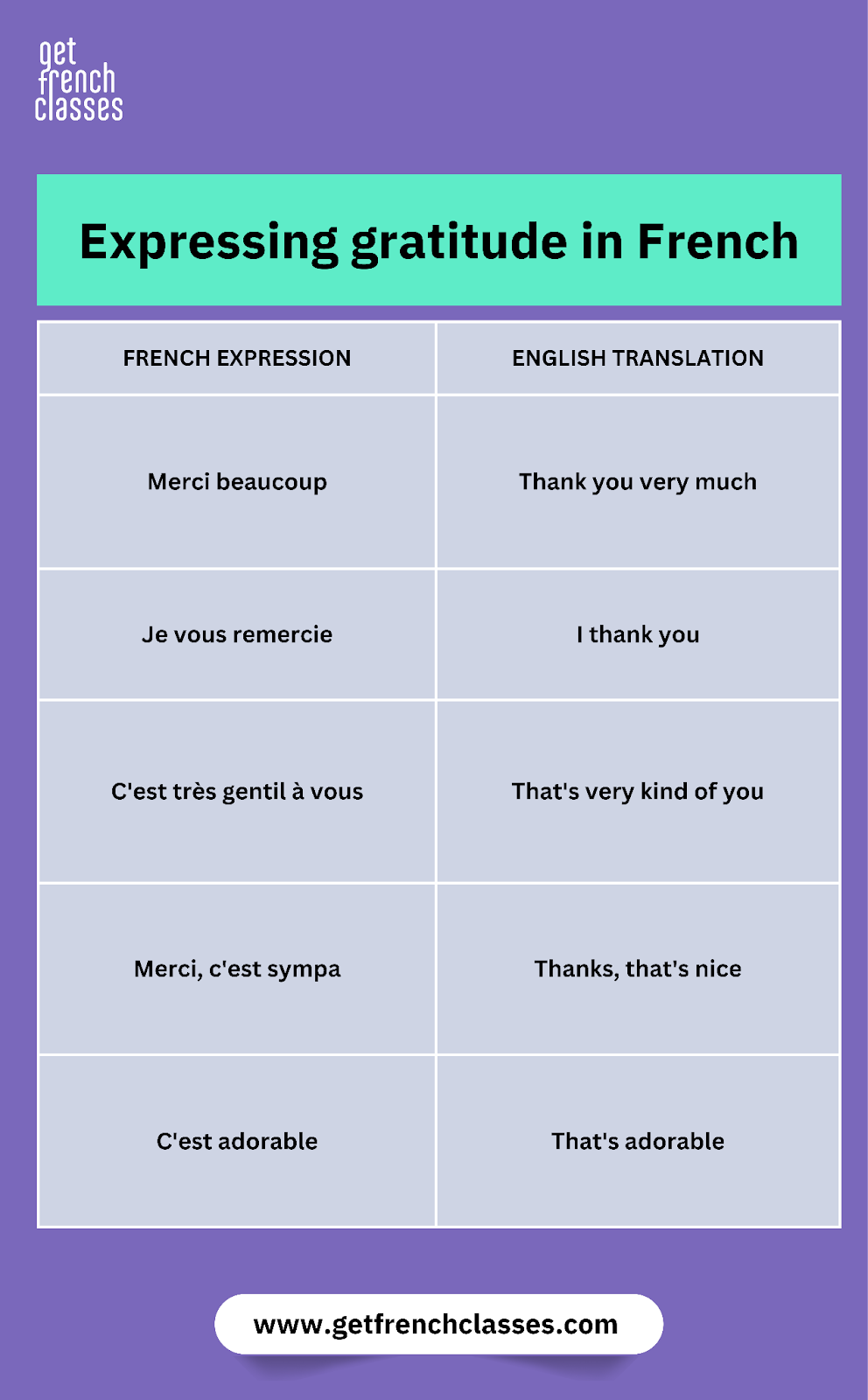From the straightforward “Bonne chance” to the surprisingly theatrical word “Merde,” French expressions of good luck are as varied as they are fascinating. These phrases do more than just wish someone well; they offer a glimpse into the French psyche, revealing attitudes towards fate, success, and the unpredictable nature of life itself.
The term 'meilleurs voeux' (best wishes), which means luck is commonly used in greeting cards for various life events and celebrations, such as New Year's, birthdays, weddings, and other milestones, illustrating its versatility in conveying heartfelt encouragement and congratulations.
In this comprehensive guide, we’ll explore the myriad ways to wish someone good luck in French.
Common ways to say "good luck" in French
The French language offers a variety of expressions to wish someone good luck, ranging from the straightforward to the surprisingly colorful. Let's explore the most common ways to extend your French good luck.
"Bonne chance": The most common expression
“Bonne chance” is the French equivalent of “good luck” and is the most widely used expression in most situations.
| French | Pronunciation | Literal Translation | Usage |
|---|---|---|---|
| Bonne chance | /bɔn ʃɑ̃s/ | Good luck | General use, suitable for most situations |
Usage examples:
-
Before an exam: “ Bonne chance pour ton examen! “ ( Good luck on your exam! )
2. Job interview: “Bonne chance pour ton entretien!” ( Good luck with your interview! )
3. General well-wishing: “ Bonne chance dans ta nouvelle aventure! “ or “Bonne continuation” ( Good luck on your new adventure! )
Cultural note : While “Bonne chance” is universally accepted, some French speakers prefer more specific expressions or even avoid luck-based phrases altogether, opting instead for skill-based encouragement. Another common expression is "je touche du bois," which parallels the English superstition of touching wood to avoid jinxing something positive. This phrase is often accompanied by the gesture of physically touching wood to invoke good fortune.
"Merde": An unconventional but widely used expression
Common superstition word "Merde" literally is considered bad luck word in English, but in the context of wishing luck, it's similar to saying "Break a leg" in English.
| French | Pronunciation | Literal Translation | Usage |
|---|---|---|---|
| Merde | /mɛʁd/ | Sh*t | Informal, often used in performing arts or high-pressure situations |
Usage examples:
-
To an actor before a performance: " Merde pour ton spectacle ce soir! " ( Break a leg for your show tonight! )
-
Before a crucial presentation: " Je te dis merde pour ta présentation! " ( I wish you luck for your presentation! )
Cultural note : This expression originates from the theater world. It's believed that wishing an actor good luck was bad luck, so "merde" was used instead. Today, it's used more broadly, but it still carries a theatrical flair.
Important : Use this expression cautiously. While common among friends and in artistic circles, it may be inappropriate in formal settings or with people you don't know well.
Other general expressions for wishing luck
French offers several other expressions to wish someone luck, each with its own nuance:
-
"Je croise les doigts pour toi."
-
Pronunciation : /ʒə kʁwaz le dwa puʁ twa/
-
Literal translation : I'm crossing my fingers for you.
-
Usage : Similar to the English expression, used to show you're hoping for a positive outcome.
-
-
"Que la chance soit avec toi"
-
Pronunciation : /kə la ʃɑ̃s swa avɛk twa/
-
Literal translation : May luck be with you.
-
Usage : A more formal or dramatic way of wishing luck, similar to "May the force be with you."
-
-
"Je te souhaite bonne chance"
-
Pronunciation : /ʒə tə su.ɛt bɔn ʃɑ̃s/
-
Literal translation : I wish you good luck.
-
Usage : A more personal and warm way of expressing "good luck."
-
-
"Tous mes vœux de réussite"
-
Pronunciation : /tu me vø də ʁey.sit/
-
Literal translation : All my wishes for success.
-
Usage : More formal, often used in professional contexts or for significant life events.
-
-
"Bonne chance, et que tout se passe bien !"
-
Pronunciation : /bɔn ʃɑ̃s e kə tu sə pas bjɛ̃/
-
Literal translation : Good luck, and may everything go well!
-
Usage : A comprehensive way of wishing both luck and a positive outcome
-
Remember, the choice of expression often depends on the relationship between the speaker and the recipient, as well as the specific context.
Context-specific good luck phrases

In French, as in many languages, the way you wish someone luck can vary greatly depending on the specific context. Let's explore good luck phrases tailored to different situations in academic, professional, personal, and sporting contexts.
Academic settings (exams, presentations)
In academic environments, expressing support for fellow students or pupils is common. Here are some context-specific phrases:

| French Phrase | Pronunciation | English Translation | Usage |
|---|---|---|---|
| Bonne chance avec ton examen ! | /bɔn ʃɑ̃s puʁ tɔ̃n ɛɡzamɛ̃/ | Wishing good luck on your exam! | General exam wish |
| Je te souhaite de cartonner à ton oral. | /ʒə tə suɛt də kaʁtɔne a tɔ̃n ɔʁal/ | I hope you nail your oral presentation. | For oral exams or presentations |
| Que la force soit avec toi pour ta soutenance ! | /kə la fɔʁs swa avɛk twa puʁ ta sutənɑ̃s/ | May the force be with you for your thesis defense! | For important academic presentations |
| Bon courage pour tes révisions. | /bɔ̃ kuʁaʒ puʁ te ʁevizjɔ̃/ | Good luck with your revision. | Encouraging study efforts |
Cultural note: In French academic settings, it's common to emphasize hard work and preparation over luck. Hence, common expressions like "Bon courage" (literally "good courage") are frequently used.
Professional contexts (job interviews, projects)
In professional situations, the language tends to be more formal, but there's still room for encouragement:

| French Phrase | Pronunciation | English Translation | Usage |
|---|---|---|---|
| Je vous souhaite un bon entretien. | /ʒə vu suɛt œ̃ bɔ̃n ɑ̃tʁətjɛ̃/ | I wish you a good interview. | Formal, for job interviews |
| Bonne chance pour votre présentation. | /bɔn ʃɑ̃s puʁ vɔtʁə pʁezɑ̃tasjɔ̃/ | Good luck with your presentation. | For work presentations |
| Tous mes vœux de réussite pour ce projet. | /tu me vø də ʁeysi puʁ sə pʁɔʒɛ/ | All my wishes for success on this project. | Formal, for major projects |
| Que tout se passe comme sur des roulettes ! | /kə tu sə pas kɔm syʁ de ʁulɛt/ | May everything go smoothly! | Less formal, for general work situations |
Cultural note : In French professional settings, it's often appreciated to acknowledge the person's competence along with wishing them luck.
Personal life (relationships, personal goals)
For personal matters, French expressions can be more varied and colorful:

| French Phrase | Pronunciation | English Translation | Usage |
|---|---|---|---|
| Bonne chance dans ta nouvelle vie ! | /bɔn ʃɑ̃s dɑ̃ ta nuvɛl vi/ | Good luck in your new life! | For major life changes |
| Je croise les doigts pour que ça marche entre vous. | /ʒə kʁwaz le dwa puʁ kə sa maʁʃ ɑ̃tʁə vu/ | I'm crossing my fingers that it works out between you. | For relationships |
| Que tous tes vœux se réalisent ! | /kə tu te vø sə ʁealizə/ | May all your wishes come true! | For personal aspirations |
| Bonne chance pour ton déménagement ! | /bɔn ʃɑ̃s puʁ tɔ̃ demenɑʒəmɑ̃/ | Good luck with your move! | For specific life events |
Cultural note : In personal contexts, French speakers often use more emotive and supportive language, showing their personal investment in the other person's success.
Sports competition
Sports-related good luck in French can be quite enthusiastic:

| French Phrase | Pronunciation | English Translation | Usage |
|---|---|---|---|
| Allez, tu vas tout déchirer ! | /ale ty va tu deʃiʁe/ | Come on, you're going to crush it! | Very informal, for sports |
| Bonne chance pour la compétition ! | /bɔn ʃɑ̃s puʁ la kɔ̃petisjɔ̃/ | Good luck for the competition! | General use for competitions |
| Que le meilleur gagne ! | /kə lə mɛjœʁ ɡaɲə/ | May the best person win! | Before a contest or match |
| On est tous derrière toi ! | /ɔ̃ e tu dɛʁjɛʁ twa/ | We're all behind you! | Showing support for an athlete or team |
Cultural note : In sports contexts, French speakers often use more dynamic and energetic expressions to convey enthusiasm and support.
Superstitions and luck in French culture
Like many cultures worldwide, French culture has its own set of beliefs and practices related to luck and superstition. While not everyone in France adheres to these beliefs, understanding them can provide fascinating insights into French cultural history and social practices.
Lucky and unlucky numbers
In French culture, certain numbers are associated with good or bad luck:
| Number | Significance | Explanation |
|---|---|---|
| 7 | Lucky | Considered lucky in many Western cultures, including France |
| 13 | Unlucky | Friday the 13th is considered particularly unlucky |
| 3 | Lucky | Often associated with good things coming in threes |
| 4 | Neutral to slightly unlucky | Less significant than in some Asian cultures |
| 8 | Lucky | Considered lucky due to its symmetrical shape |
Cultural notes:
-
"Vendredi 13" (Friday the 13th) is considered unlucky, but some see it as a lucky day to buy lottery tickets.
-
In some apartment buildings or hotels, the 13th floor might be labeled as 12bis or skipped entirely.
Good luck charms and talismans
French culture has several objects believed to bring good luck:
-
Le trèfle à quatre feuilles ( Four-leaf clover )
-
Considered very lucky if found naturally
-
Often given as a gift for New Year’s
2. Le fer à cheval ( Horseshoe )
-
Should be hung with the open end up to “hold” the luck
-
Often seen in rural areas or as decorative items
-
The upside-down horseshoe is also significant, as hanging it over a door is a traditional practice to attract positive fortune
3. La coccinelle ( Ladybug )
-
Seen as a sign of good luck, especially in gardens
-
Representations often used in jewelry or decorations
4. Le brin de muguet ( Sprig of lily of the valley )
-
Given on May 1st (La Fête du Travail) for good luck and happiness
-
This tradition dates back to the Renaissance
5. Le sou percé ( Pierced penny )
-
An old coin with a hole in it, carried in wallets or purses
-
Believed to attract wealth and prevent the bearer from going broke
Cultural note : While these charms are part of French folklore, their use varies greatly among individuals. They’re often seen more as cultural symbols than serious luck-bringing tangible objects.
Rituals and customs for attracting good luck
French culture includes several practices believed to influence one's luck:
-
Touch wood ( Toucher du bois )
-
Similar to "knock on wood" in English-speaking cultures
-
Used to avoid tempting fate after mentioning good fortune
-
-
Stepping in dog or horse excrement with your left foot ( Avoir du pot )
-
Strangely, this is considered lucky in France
-
The phrase "J'ai du pot" (literally, "I have some poo") which is literally translated to "I'm lucky."
-
-
Breaking a mirror ( Casser un miroir )
-
Considered to bring 7 years of bad luck, as in many cultures
-
To counter this, the broken pieces should be thrown in a running river
-
-
" La pièce dans la galette des rois " ( The coin in the king's cake )
-
During Epiphany, finding the charm in your slice of cake makes you "king for a day"
-
It's also considered to bring good luck for the year
-
-
New Year's Eve rituals
-
Eating 12 grapes at midnight, one for each stroke of the clock
-
Kissing under the mistletoe (unlike in Anglo-Saxon countries, where this is a Christmas tradition)
-
-
Wedding traditions
-
The bride stepping on the groom's feet during the ceremony for good luck in the marriage
-
Pinning money to the bride's dress during the first dance for financial prosperity
-
Cultural note : Many of these customs are practiced more for fun or tradition rather than serious belief. French people often engage in these rituals with a sense of amusement or as a nod to their cultural heritage.
Responding to good luck wishes in French
When someone wishes you good luck in French, it's important to know how to respond appropriately. Your response can vary depending on the formality of the situation and your relationship with the person. Let's explore various ways to express gratitude and common replies to good luck wishes in French.
Expressing gratitude
Expressing gratitude is a crucial part of responding to good-luck wishes. Here are some ways to say "thank you" in French, ranging from formal to informal:

| French expression | Pronunciation | English translation | Usage |
|---|---|---|---|
| Merci beaucoup | /mɛʁsi boku/ | Thank you very much | Universal, suitable for most situations |
| Je vous remercie | /ʒə vu ʁəmɛʁsi/ | I thank you | Formal, used in professional settings |
| C'est très gentil à vous | /sɛ tʁɛ ʒɑ̃ti a vu/ | That's very kind of you | Formal, expressing appreciation |
| Merci, c'est sympa | /mɛʁsi sɛ sɛ̃pa/ | Thanks, that's nice | Informal way, among friends |
| C'est adorable | /sɛ tadɔʁabl/ | That's adorable | Informal, expressing warmth |
Cultural note : French people often combine expressions of gratitude with other phrases to create a more complete response.
Common replies and their meanings
After expressing gratitude, you might want to add a bit more to your response. Here are some common replies to good luck wishes:
-
"Merci, j'en aurai besoin !"
-
Pronunciation : /mɛʁsi ʒɑ̃n oʁe bəzwɛ̃/
-
Meaning : "Thanks, I'll need it!"
-
Usage : A humble response acknowledging that luck might be necessary
-
-
"Merci, je ferai de mon mieux !"
-
Pronunciation : /mɛʁsi ʒə fəʁe də mɔ̃ mjø/
-
Meaning : "Thanks, I'll do my best!"
-
Usage : Shows determination and appreciation for the wish
-
-
"Merci, ça me touche !"
-
Pronunciation : /mɛʁsi sa mə tuʃ/
-
Meaning : "Thanks, I'm touched!"
-
Usage : Expresses that you're moved by the person's thoughtfulness.
-
-
"Merci, c'est gentil de penser à moi !"
-
Pronunciation : /mɛʁsi sɛ ʒɑ̃ti də pɑ̃se a mwa/
-
Meaning : "Thanks, it's kind of you to think of me!"
-
Usage : Acknowledges the person's consideration
-
-
"J'espère que ça va marcher !"
-
Pronunciation : /ʒɛspɛʁ kə sa va maʁʃe/
-
Meaning : "I hope it will work out!"
-
Usage : Expresses optimism and can be added after a thank you.
-
-
"Croisons les doigts !"
-
Pronunciation : /kʁwazɔ̃ le dwa/
-
Meaning : "Let's cross our fingers!"
-
Usage : A casual way to acknowledge the wish and express hope.
-
-
"Merci, à toi aussi !" (if applicable)
-
Pronunciation : /mɛʁsi a twa osi/
-
Meaning : "Thanks, to you too!"
-
Usage : When you want to return the wish, if appropriate
-
Specific responses to "Merde":
When someone wishes you "Merde" (typically in a performance context), the traditional responses are:
-
"Je mange !" Literally, "I eat!" is the standard response in theater.
-
"Merci !" A simple "Thanks!" is also acceptable.
Cultural note : Responding to "Merde" with "Merci" or "Je mange" shows you're familiar with French theatrical traditions.
Examples of complete responses:
-
Formal situation (e.g., before a job interview): " Je vous remercie, ça me touche. Je ferai de mon mieux ! " ( Thank you, I'm touched. I'll do my best! )
-
Informal situations (e.g., before a friendly sports match): " Merci, c'est sympa ! Croisons les doigts ! " ( Thanks, that's nice! Let's cross our fingers! )
-
Response to a close friend: " Merci mon pote, j'en aurai besoin ! Souhaite-moi de ne pas me planter ! " ( Thanks buddy, I'll need it! Wish me not to mess up! )
Remember, the key to responding to good luck wishes in French is to match the tone and formality of the person who wished you luck.
Good luck in French idioms and proverbs
The following table presents popular French idioms and proverbs related to luck, fortune, and misfortune.

It includes their literal translations, meanings, and usage, or English equivalents where applicable.
| French Expression | Literal Translation | Meaning | Usage/English equivalent |
|---|---|---|---|
| La chance sourit aux audacieux | Luck smiles upon the bold | Success comes to those who take risks | Fortune favors the brave |
| Jouer de chance | To play with luck | To be lucky | "Il a joué de chance en gagnant à la loterie." (He got lucky winning the lottery.) |
| Avoir une chance de cocu | To have a cuckold's luck | To be extremely lucky | Colloquial, use cautiously |
| Né avec une cuillère en argent dans la bouche | Born with a silver spoon in the mouth | To be born into wealth or privilege | Born with a silver spoon in one's mouth |
| Ça porte bonheur | It brings happiness | It brings good luck | "Toucher du bois, ça porte bonheur." (Touching wood brings good luck.) |
| Avoir le cul bordé de nouilles | To have one's bottom lined with noodles | To be incredibly lucky | Very informal expression |
| Quand on parle du loup, on en voit la queue | When one speaks of the wolf, one sees its tail | Said when someone appears just as they are being talked about | Speak of the devil and he shall appear |
| Avoir de la veine | To have vein | To be lucky | "Tu as de la veine d'avoir trouvé un billet de 50 euros par terre !" |
| Pas de chance ! | No luck! | Used to express sympathy for bad luck | Tough luck! |
| La roue tourne | The wheel turns | Fortunes change; what goes around comes around | Often used to console someone in difficult times |
| Chassez le naturel, il revient au galop | Chase away the natural and it returns at a gallop | You can't change someone's true nature | A leopard can't change its spots |
| Jamais deux sans trois | Never two without three | Good or bad things often come in threes | Things happen in threes |
| Après la pluie, le beau temps | After the rain, good weather | Good times follow bad times | Every cloud has a silver lining |
| Qui vivra verra | Who will live will see | Time will tell; let's wait and see what happens | Expresses a wait-and-see attitude |
| Un malheur n'arrive jamais seul | A misfortune never comes alone | Bad things tend to happen in series | When it rains, it pours |
| C'est un coup de pot | It's a stroke of pot | It's a stroke of luck | "Trouver un taxi libre un soir de Nouvel An, c'est un vrai coup de pot !" |
| Avoir la baraka | To have the baraka (blessing) | To have a run of good luck | "Il a la baraka en ce moment, tout lui réussit." |
These idioms and proverbs reflect French cultural attitudes towards luck and fate, showing a mix of fatalism and pragmatism. Using them can add color to your French conversations and demonstrate a deeper understanding of the language and culture.
"Good Luck" in French FAQ
Here are some frequently asked questions about saying and using "Good Luck" in French:
What is the most common way to say Good Luck in French?
The most common and straightforward way is "Bonne chance." This phrase is widely used and appropriate in most situations.
Is it true that French people sometimes say "Merde" for good luck?
Yes, it's true. "Merde" (literally meaning "sh*t") is used to wish good luck, especially in performance contexts like theater or music. It's similar to saying "Break a leg" in English. However, use it cautiously, as it's informal and context-specific.
How do I wish someone good luck for an exam in French?
You can say, "Bonne chance pour ton examen!" (Good luck for your exam!) or "Je te souhaite une bonne chance pour ton examen." (I wish you good luck for your exam.)
Is there a difference between "Bonne chance" and "Bon courage"?
Yes. While both can be translated as "Good luck," they have slightly different uses:
-
"Bonne chance" is used for situations involving chance or luck.
-
"Bon courage" is used for situations requiring effort or endurance, similar to "Good luck" or "Hang in there" in English.
How formal is "Je vous souhaite bonne chance"?
"Je vous souhaite bonne chance" is a formal way to wish someone good luck. It's appropriate in professional settings or when addressing someone you're not familiar with.
Are there any superstitions about saying "Good luck" in French?
Some people believe that wishing "Bonne chance" can actually bring bad luck. In these cases, alternatives like "Bon courage" or "Je pense à toi" (I'm thinking of you) are preferred.
How do French speakers respond to "Bonne chance"?
Common responses include:
-
"Merci!" (Thank you!)
-
"Merci beaucoup!" (Thank you very much!)
-
"Merci, j'en aurai besoin!" (Thanks, I'll need it!)
Is it appropriate to say "Bonne chance" in a business context?
While it's not inappropriate, in business contexts, it's often preferred to wish for success rather than luck. You might say, "Je vous souhaite beaucoup de succès" (I wish you much success) instead.
How do you say "Good luck with your new job" in French?
You can say "Bonne chance pour ton nouveau travail" or "Bonne chance dans tes nouvelles fonctions" for a more formal tone.
Are there regional differences in how "Good luck" is expressed in French-speaking countries?
Yes, there are some regional variations. For example:
-
In Quebec, "Merde" is less commonly used; "Bonne chance" is more standard.
-
In some African French-speaking countries, more elaborate good luck wishes might be appreciated.
Can "Bonne chance" be used sarcastically in French?
Yes, like in English, "Bonne chance" can be used sarcastically, often with a change in tone of voice. Context is key to understanding whether it's meant sincerely or sarcastically.
Is there a French equivalent to the English phrase "fingers crossed"?
Yes, the French equivalent is "Je croise les doigts" (I'm crossing my fingers). It's used in similar contexts to express hope for a positive outcome.

